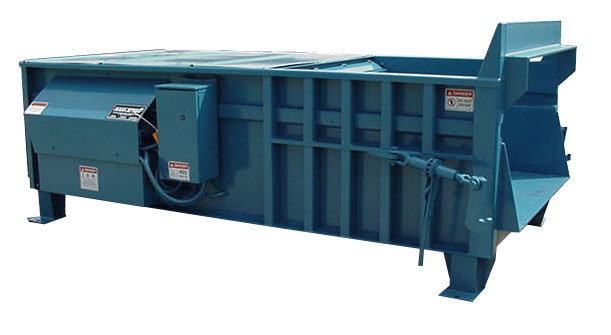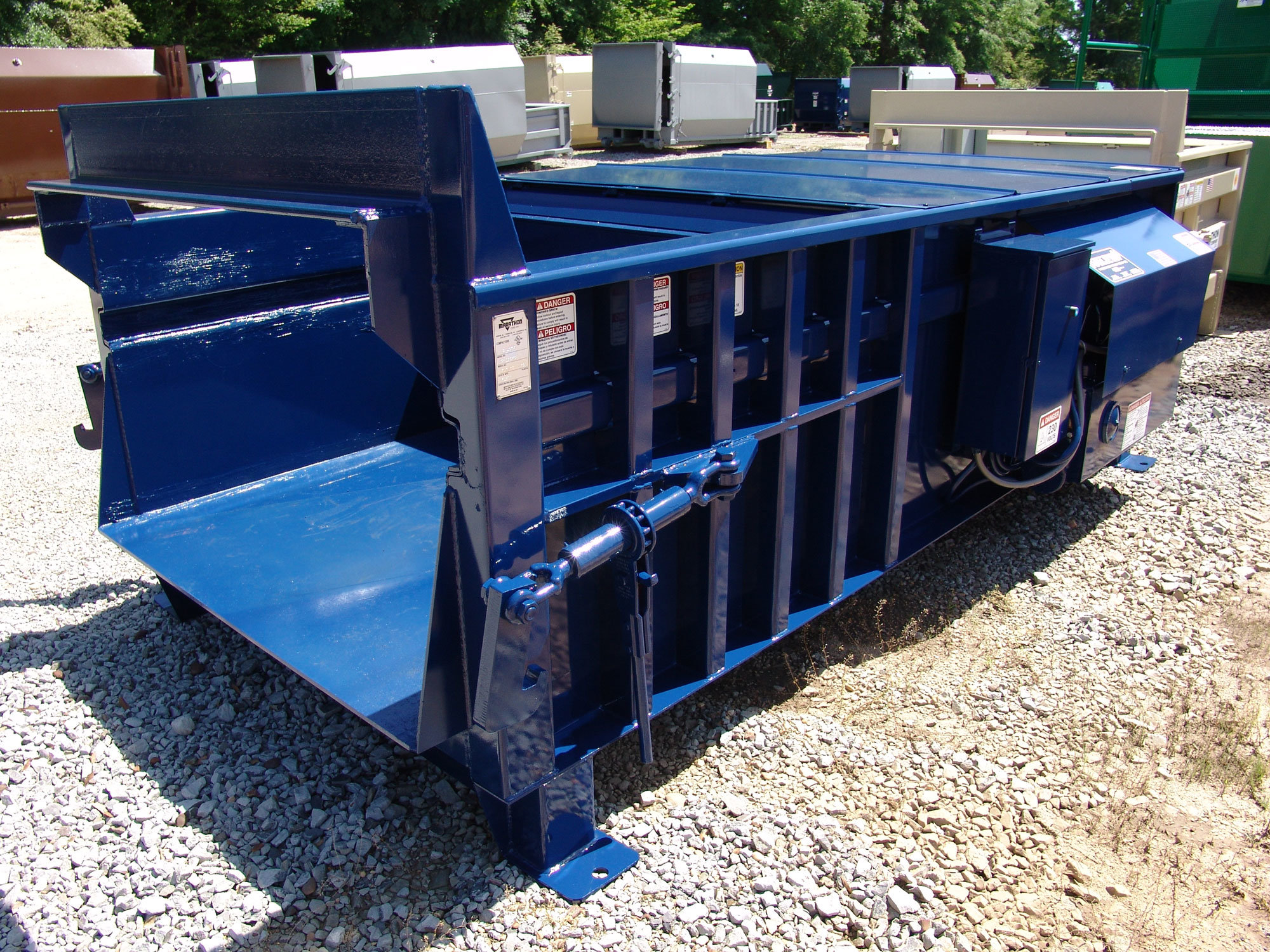Recognizing the Various Usages of Waste Devices in the Recycling Sector
The recycling sector depends greatly on specialized waste equipment to maximize processing and healing. Each tool, from shredders to balers, serves a distinctive purpose that boosts overall performance. Recognizing these roles is necessary for improving sustainability initiatives. Commercial garbage compaction equipment. As innovation advancements, new advancements emerge, assuring to change conventional methods. This development raises important concerns regarding the future of waste administration and its impact on ecological conservation. What adjustments exist in advance for this vital market?
The Duty of Shredders in Product Handling
Shredders play a vital role in the recycling industry by successfully processing numerous kinds of waste products. These machines are designed to minimize big things, such as plastics, steels, and natural waste, into smaller sized, workable pieces. This dimension reduction is crucial for subsequent recycling processes, as it allows for easier handling and sorting. Along with facilitating recycling, shredders enhance safety by lessening the threat of injury connected with handling bulky waste products.
Additionally, shredders contribute to ecological sustainability by guaranteeing that materials are processed in a method that makes best use of source recuperation. They can take care of a diverse series of products, making them functional tools in waste monitoring centers. The reliable operation of shredders not just streamlines the reusing process but additionally raises the general effectiveness of waste diversion initiatives, advertising a round economic situation. Their significance in material processing can not be overstated, as they function as a foundational action in the direction of sustainable waste monitoring techniques.

Exactly How Balers Enhance Performance in Waste Administration
Balers significantly enhance efficiency in waste management by condensing numerous materials right into bales, which streamlines storage and transportation. By pressing recyclables such as cardboard, plastics, and steels, balers considerably decrease the volume of waste. This compression not just makes best use of area in recycling centers but also decreases the number of trips called for to carry materials, bring about lower fuel expenses and reduced environmental influence.
Balers contribute to improved security in waste administration procedures. Small bales are much easier to pile and manage, lowering the threat of mishaps connected with loosened products. The uniform dimension of bundles permits extra efficient packing and unloading procedures, streamlining operations within reusing centers. Additionally, balers can enhance the total quality of recyclables, as effectively compressed products are much less likely to be polluted. Overall, balers play a vital function in enhancing waste administration techniques, advertising sustainability in the recycling industry.
Conveyor Systems: Streamlining the Recycling Refine
Integrating sophisticated equipment like balers significantly improves waste monitoring procedures, however the effectiveness of the reusing procedure is better enhanced through using conveyor systems. These systems play an important duty in the seamless transport of materials within recycling facilities. By facilitating the motion of different waste kinds, conveyor systems decrease hands-on handling and decrease the risk of contamination throughout the recycling procedure.
In addition, conveyor systems can be personalized to fit the one-of-a-kind formats and operational needs of recycling centers. Their ability to operate continuously permits a steady circulation of products, improving performance and making certain that sorting and refining devices gets a constant supply.
Outfitted with functions like adjustable speeds and automated controls, conveyor systems can enhance the circulation of products, considerably improving total performance (Commercial garbage compaction equipment). These systems are essential in modern-day recycling procedures, simplifying processes and adding to reliable waste management.
Sorting Devices: The Secret to Material Recuperation
Arranging equipments are necessary parts in the reusing sector, greatly boosting the performance of product recuperation. These makers play a pivotal duty in the separation of numerous recyclable products, permitting a streamlined procedure that optimizes resource extraction. By making use of innovative technologies, such as optical sensors and air classifiers, sorting machines can identify and classify products based upon their composition, important site weight, and size. This capacity guarantees that steels, plastics, and paper products are properly isolated, decreasing contamination and improving the high quality of recycled outcome.
The procedure of arranging machines considerably lowers the reliance on manual work, which can be both taxing and prone to mistakes - Commercial garbage compaction equipment. Furthermore, the automation offered by these machines accelerates the general recycling process, bring about greater throughput and increased functional effectiveness. Subsequently, arranging makers are indispensable in attaining sustainable waste administration objectives, making it possible for the reusing industry to successfully recuperate important products while minimizing landfill dependency

Developments in Waste Equipment for a Sustainable Future
Recent innovations in waste equipment are driving the reusing industry toward a more sustainable future. Developments such as automated arranging systems, which use expert system and maker understanding, enhance efficiency by precisely identifying and separating recyclables. This results in greater healing prices and decreased contamination. Additionally, advancements in condensing innovation enable extra reliable transport of materials, minimizing carbon footprints throughout transportation.
Developments in shredding devices boost the handling of complex materials, allowing the recycling of products that were once regarded non-recyclable. The assimilation of eco-friendly power sources, like solar power, in waste processing facilities better adds to sustainability objectives. Furthermore, technologies in waste-to-energy innovations and biodegradable products are reshaping the landscape of waste monitoring. Jointly, these improvements indicate a transformative change within the recycling market, promoting not just environmental protection however likewise financial stability for future generations.
Often Asked Concerns
What Kinds of Materials Can Waste Tools Take Care Of?
The kinds of materials waste devices can take care of consist of plastics, steels, paper, glass, and natural waste. Each equipment kind is designed for certain materials, maximizing performance and performance in sorting and refining various waste streams.
Just How Usually Should Waste Devices Be Kept?

Are There Safety And Security Worry About Making Use Of Waste Tools?
Safety worry about utilizing waste equipment consist of potential injuries from mechanical malfunctions, direct exposure to harmful products, and insufficient training. Correct upkeep, normal evaluations, and staff member education and learning are crucial to alleviate these dangers successfully in any kind of setup.
What Is the Typical Lifespan of Recycling Devices?
The ordinary life expectancy of recycling tools typically varies from 10 to two decades, depending on factors such as use intensity, maintenance methods, and technical developments, which can substantially affect sturdiness and performance gradually.
Exactly How Is Waste Devices Powered in Recycling Facilities?
Waste devices in recycling centers is usually powered by power, though some makers may use alternative energy resources like natural gas or diesel. This power makes it possible for effective processing and makeover of products for reusing purposes.
Shredders play a crucial duty in the recycling sector by successfully processing different kinds of waste materials. They can take care of a diverse array of materials, making them functional tools in waste management facilities. Balers significantly boost effectiveness in waste management by condensing numerous materials into bales, which streamlines storage and transportation. The types of products waste tools can take care of include plastics, metals, paper, glass, and natural waste. Security problems with making use of waste equipment include prospective injuries from mechanical breakdowns, direct exposure to harmful products, and poor training.